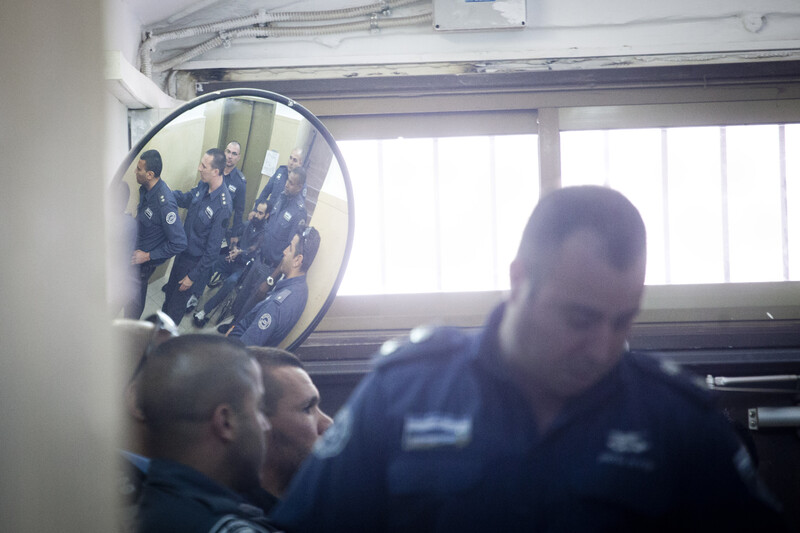Rights and Accountability 21 February 2013

Mirror reflection shows Samer Issawi taken into his court hearing in the magistrate court in Jerusalem, 21 February 2013.
ActiveStillsPalestinian political prisoner Samer Issawi, who has been on full and partial hunger strike since his arrest at a Jerusalem checkpoint in July 2012, was sentenced to eight months today by a Jerusalem magistrate court. His sentence begins at the date of his arrest, meaning that he has one month of this sentence left to serve.
Shireen Issawi, Samer’s sister, and the Palestinian human rights group Addameer confirmed today that Issawi vows to continue with his hunger strike which has caused his weight to dramatically drop and urgent warnings regarding his health.
However Issawi faces an additional two decades of imprisonment as Israel claims he has violated the terms of his conditional release from prison during the October 2011 prisoner exchange, invoking a military court order based on secret evidence that would compel him to serve out the remaining 20 years of his original 30-year sentence. Israel claims that Issawi, a resident of an East Jerusalem neighborhood, entered West Bank areas in violation of the conditions of his release.
Maath Musleh reported for The Electronic Intifada in August of last year:
Thirty-two-year-old Issawi is from the Palestinian village of Issawiyeh in Jerusalem. On 15 April 2002, Issawi was captured by the Israeli army in a tower near the Palestinian Authority headquarters in Ramallah during the invasion of multiple West Bank cities, dubbed by Israel “Operation Defensive Shield.” Issawi was sentenced to thirty years in prison on charges of possession of weapons and forming military groups in Jerusalem.
Issawi’s family has challenged Israel’s claims that Samer had violated the conditions of his release by entering the West Bank. Musleh reported:
[Issawi] was arrested in a location between the Palestinian village of Hizma and the Jewish-only settlement Adam, an area within the boundaries of the municipality of Jerusalem. Israel claimed that Samer broke the deal by leaving Jerusalem.
“What is Jerusalem for the Israelis?” wondered Tareq [Issawi, Samer’s father]. “Whenever it suits them, they change their definition of Jerusalem! Kufr Aqab is within the jurisdiction of the municipality of Jerusalem. Do they consider it Jerusalem or West Bank?”
Israel annexed East Jerusalem following its occupation of the West Bank after the 1967 War, though it is considered occupied territory under international law. According to the Israeli definition, the boundaries of the municipality of Jerusalem extends north to include the Palestinian village Kufr Aqab. Issawi was captured in a location within the Israeli-defined boundaries of Jerusalem, midway between Kufr Aqab and the center of the city.
Addameer says that following his July arrest, Samer Issawi was “subjected to strenuous interrogation for up to 22 hours a day as well as psychological torture such as sleep deprivation. Samer was denied his right to see a lawyer for 23 days as a tactic to pressure him during his interrogation and to isolate him.”
Solidarity protests
The recent wave of hunger strikes in Israeli prisons in the last year and a half has redirected focus on the cause of Palestinian prisoners.
Hundreds of Palestinian political prisoners held a one-day hunger strike on Tuesday in solidarity with Samer Issawi and fellow long-term strikers Ayman Sharawna, Tarek Qa’adan and Jaafar Azzidine.
There have also been regular protests in the West Bank and Gaza. The Bethlehem-based Ma’an News Agency reported that 29 protesters were injured today by rubber-coated steel bullets and “dozens more suffered tear gas inhalation” at a protest in solidarity with the hunger strikers near Ofer military prison camp in the occupied West Bank.
Palestinian journalists held a sit-in protest outside Ofer detention camp yesterday while a military court heard the cases of detained Palestinian journalists Amir Abu Arafah and political cartoonist Muhammad Sabanah, Ma’an reported, adding:
The sit-in strike was organized by the Palestinian Journalists Syndicate. During the activity, head of the union Abdul-Nasser al-Najjar said Israeli forces intensified assaults against Palestinian journalists recently. He said several journalists were directly targeted during confrontations between Israeli forces and Palestinian protesters in different locations. Al-Najjar added that dozens of Palestinian journalists were held in Israel’s custody.
Solitary confinement
Meanwhile, the lawyer for Dirar Abu Sisi, the engineer from Gaza who was kidnapped in Ukraine and is currently held in solitary confinement in Israel, is losing “losing his ability to recall language and has speech impairments, a lawyer who visited him in jail said Sunday,” Ma’an reported.
Ma’an added:
Abu Sisi disappeared in February 2011 while traveling on a train in Ukraine and Israel later announced that it was holding him in a southern Israeli jail.
He was the only prisoner excluded from a May 2012 deal with Israeli authorities to end solitary confinement, according to prisoners rights group Addameer.
The deal, which included several terms to improve prisoners conditions, was made to end a mass hunger strike campaign launched by Palestinian prisoners.
The order to keep Abu Sisi in isolation was renewed for another six months on Nov. 1, 2012.
The prisoners society lawyer said Abu Sisi told him prison guards were implementing other punitive measures.
They bring him rotten food, and recently confiscated his notebook where he records his thoughts during his isolation, Abu Sisi said.
The technical director at Gaza’s sole electricity plant, Abu Sisi was charged with developing Hamas’ rocket capabilities. Abu Sisi denies the charges and Hamas says he has no affiliation to the group.





